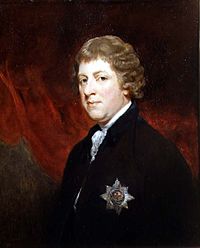Granville Leveson-Gower, 1st Marquess of Stafford
|
The Most Honourable The Marquess of Stafford PC |
|
|---|---|
 |
|
| Lord Privy Seal | |
|
In office 1755–1757 |
|
| Monarch | George II |
| Prime Minister |
The Duke of Newcastle The Duke of Devonshire |
| Preceded by | The Duke of Marlborough |
| Succeeded by | The Earl Temple |
|
In office 1784–1794 |
|
| Monarch | George III |
| Prime Minister | Hon. William Pitt the Younger |
| Preceded by | The Duke of Rutland |
| Succeeded by | The Earl Spencer |
| Lord President of the Council | |
|
In office 22 December 1767 – 24 November 1779 |
|
| Monarch | George III |
| Prime Minister |
The Earl of Chatham The Duke of Grafton Lord North |
| Preceded by | The Earl of Northington |
| Succeeded by | The Earl Bathurst |
|
In office 19 December 1783 – 1 December 1784 |
|
| Monarch | George III |
| Prime Minister | Hon. William Pitt the Younger |
| Preceded by | The Viscount Stormont |
| Succeeded by | The Lord Camden |
| Personal details | |
| Born | 4 August 1721 |
| Died |
26 October 1803 (aged 82) Trentham Hall, Staffordshire |
| Nationality | British |
| Political party | Tory |
| Spouse(s) | (1) Elizabeth Fazakerley (d. 1746) (2) Lady Louisa Egerton (d. 1761) (3) Lady Susannah Stewart (d. 1805) |
| Alma mater | Christ Church, Oxford |
Granville Leveson-Gower, 1st Marquess of Stafford PC (4 August 1721 – 26 October 1803), known as Viscount Trentham from 1746 to 1754 and as The Earl Gower from 1754 to 1786, was a British politician from the Leveson-Gower family.
Stafford was a son of John Leveson-Gower, 1st Earl Gower (1694-1754) and his wife Lady Evelyn Pierrepont. His maternal grandparents were Evelyn Pierrepont, 1st Duke of Kingston-upon-Hull and his first wife Lady Mary Feilding. Mary was a daughter of William Feilding, 3rd Earl of Denbigh and his wife Mary King. His father was a prominent Tory politician who became the first major Tory to enter government since the succession of George I of Great Britain, joining the administration of John Carteret, 2nd Earl Granville in 1742. Gower was educated at Westminster School and Christ Church, Oxford.
In 1744, Stafford was elected to parliament. With the death of his elder brother in 1746, he became known by the courtesy title of Viscount Trentham until he succeeded his father as Earl Gower in 1754. Stafford was associated with the faction of the Duke of Bedford, who was his brother-in-law, and as a member of that faction was given many governmental positions. Following Bedford's death in 1771, Gower became leader of the group, and as Lord President in the administration of Frederick North, Lord North was a key supporter of a hard-line policy towards the American colonists.
Gower was frustrated by what he saw as the North administration's inept handling of the American Revolutionary War, and he resigned from the cabinet in 1779. When North resigned in March 1782, Gower was approached to form a ministry, but he refused, and he refused subsequent overtures from both Lord Shelburne and the Fox-North coalition to enter the government. Instead, he became a key figure in bringing about the fall of the Fox-North coalition, and was rewarded with the position of Lord President once again in the new administration of William Pitt the Younger. Although he soon exchanged this office for that of Lord Privy Seal, and gradually began to withdraw from public affairs, he remained a cabinet minister until his retirement in 1794. In 1786, he had been created Marquess of Stafford as a reward for his services.
...
Wikipedia
